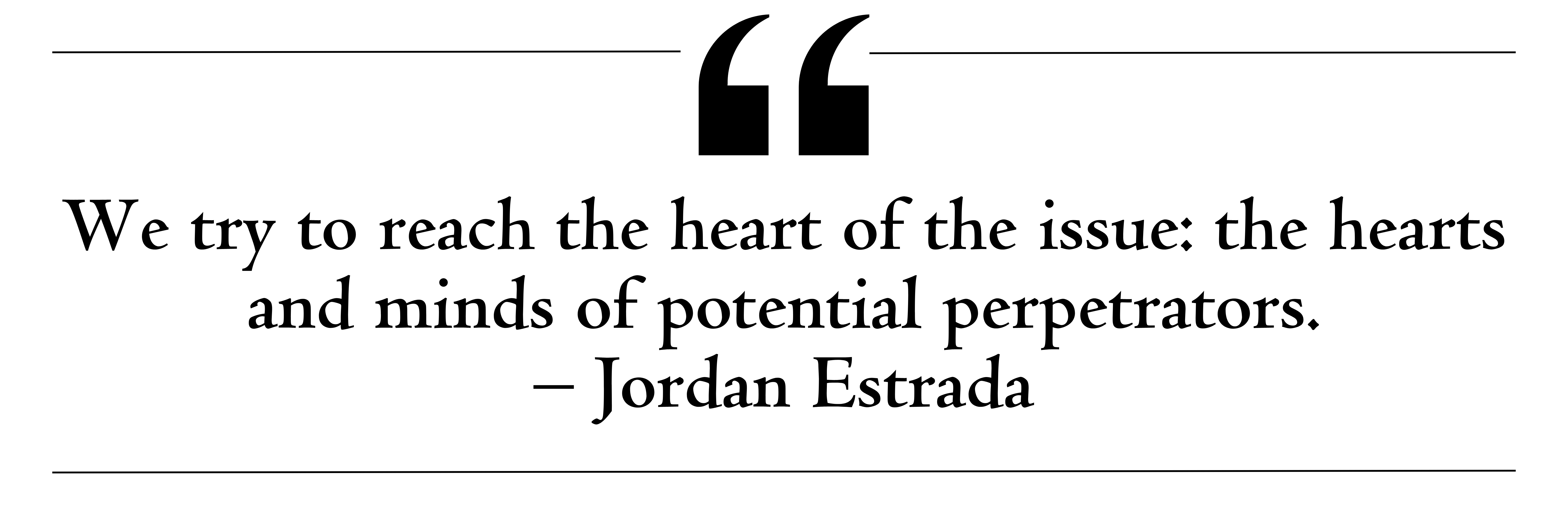.gif?width=714&height=599&name=NEW%20blog%20banner%20(23).gif)
It was June 2022. Two mass shootings took 31 lives in less than two weeks; one in Uvalde, Texas, and the other in Buffalo, New York. Terror gripped the nation—in schools and stores, theatres and malls. In times of mass, arbitrary violence, nobody is safe; the public is not safe from the violent, and the violent are not even safe from themselves. In response to this terror, eight alumni at Patrick Henry College decided to join forces and do something to reduce the horrors of mass violence in America.
Alumni Jordan and Brianna Estrada, Andrea Rogers, Charlotte Blacklock, Adam Nicholson, and PHC-father who wishes to remain anonymous joined together to create a non-profit aimed at innovating new methods to reach potential shooters and reduce national violence. On the front page of their website read the words, “Everybody is talking about mass shooters. But nobody is talking to them.” The name of the non-profit reflects its intended goal: “Let’s Talk To Them” (LT3).
Jordan Estrada, the acting director of the organization, explained the new initiative as “completely a-political and non-legislative. Rather than trying to promote laws or policy changes, we try to reach the heart of the issue: the hearts and minds of potential perpetrators,” he said. The goal of the organization is to reach potential mass shooters and redirect them onto a better path before they ruin their own lives and the lives of their victims.
Estrada’s background as an industrial security manager and first responder “definitely prepared [him] to lead LT3,” he said. A huge focus in both of those roles was to prepare for potential active shooter situations, which Estrada still does at LT3.
While it is beneficial for organizations to do retroactive damage control after violence has occurred, LT3 focuses on preemptive intervention. By reaching out to individuals who may be at risk of mass murder, the organization hopes to save the lives of both the potential shooters and their victims.
 The signs of a potential perpetrator “are extremely nuanced and are very situationally dependent,” Estrada said. “But as a general rule, if an individual is both suicidal and angry, victimized, or vengeful, they have probably contemplated an act of mass violence at some point, on a spectrum of ‘fleeting idea’ to ‘recurring fantasy.’” LT3 hopes to get in contact with those people who are “contemplating” violence and redirect them to the care that they need.
The signs of a potential perpetrator “are extremely nuanced and are very situationally dependent,” Estrada said. “But as a general rule, if an individual is both suicidal and angry, victimized, or vengeful, they have probably contemplated an act of mass violence at some point, on a spectrum of ‘fleeting idea’ to ‘recurring fantasy.’” LT3 hopes to get in contact with those people who are “contemplating” violence and redirect them to the care that they need.
One PHC supporter helped innovate methods for reaching potential threats: search engine optimization (SEO). Currently, although Google provides links to suicide-prevention websites if a person searches for any word relating to suicide, they provide no such links for those considering violence. “We create content psychologically optimized to connect with potential perpetrators, and then use SEO to get that content in front of them," Estrada said.
Part of the program's initiative is to help train parents, teachers, and youth leaders how to recognize and help someone who is potentially contemplating violence. The organization has already run two successful campaigns. LT3 staff has reached out to several potential perpetrators and directed them to necessary care. The program has also already helped three other organizations find a live situation with a potential shooter.
LT3 gathers intelligence in dark web locations to learn more about mass shooter subcultures and guide research. Currently, the outreach campaigns are primarily on TikTok and Instagram, but one of their goals for expansion is to conduct outreach campaigns within dark web locations as well.
“During our outreach campaigns, we regularly engage with individuals who habitually post violent and suicidal content on their social media pages,” Estrada said. “We direct these individuals to calming, caring websites, approved by experts to de-escalate thoughts of violence, with options to reach out for care.”
PHC alumni are making a difference in their communities and their country. As their website says, LT3 works to reach potential perpetrators of violence because they believe in hope. They believe in the power of community and communication. With support, this initiative can, has, and will continue to reduce the number of potentially violent offenders for years to come.
“We see potential perpetrators as the ultimate ‘lost sheep’ in need of salvation,” Estrada said. “We want to save the lives of potential victims by first saving the life of the potential perpetrator.”
If you want to learn more about the initiative or get involved, be sure to reach out to LT3 at letstalktothemnow@gmail.com.
--
Patrick Henry College exists to glorify God by challenging the status quo in higher education, lifting high both faith and reason within a rigorous academic environment; thereby preserving for posterity the ideals behind the "noble experiment in ordered liberty" that is the foundation of America.

.png?width=800&height=400&name=PHC%20(1).png)




